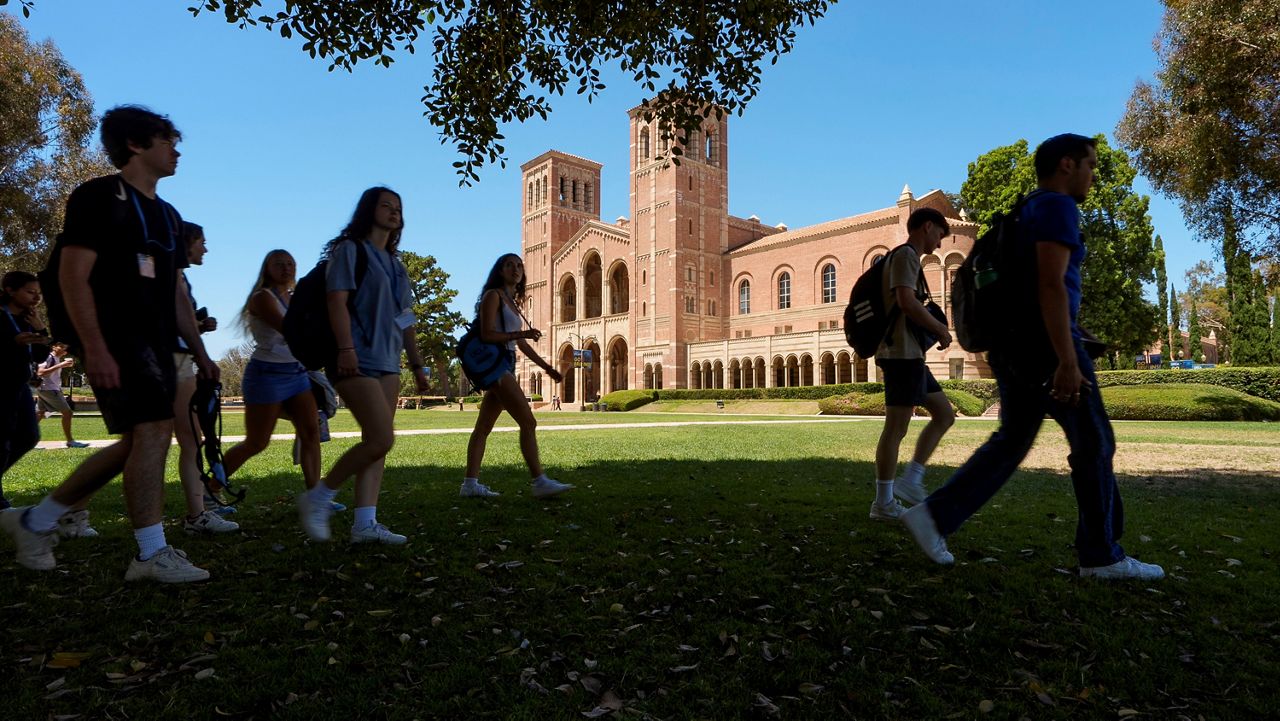LOS ANGELES — Two students and two faculty members at UCLA Tuesday sued the UC regents and university officials, alleging their rights to free speech and expression were violated when pro-Palestinian protesters were arrested at an encampment on campus last spring.
According to the Los Angeles Superior Court suit, the UCLA Police Department and other agencies, acting at the direction of UCLA and UC leadership, destroyed the encampment on May 2, resulting in the arrest of more than 200 students, staff members and supporters.
"Students decrying the genocide of Palestinians and the university's complicity were brutally shut down by the same administrators who profess to support free expression and thinking," Graeme Blair, a plaintiff in the case and an associate professor of political science, said in a statement. "As an educator, I am ashamed that the university failed our students."
The plaintiffs allege that when police broke into the encampment, protesters were not engaged in any violence or criminal activity. Nevertheless, the suit states the university unlawfully declared the protest illegal, forced many protesters to abandon the encampment, then invited police to round up and arrest those who wished to remain.
A statement from UCLA said the university is aware of the legal action and is in the process of reviewing it.
"UCLA fully supports community members expressing their First Amendment rights in ways that do not violate the law or our policies, jeopardize community safety, or disrupt the functioning of the university," according to the statement. "The encampment that arose on campus this spring became a focal point for violence, a disruption to campus, and was in violation of the law. These conditions necessitated its removal."
UCLA students launched the campus "Palestine solidarity encampment" in front of Royce Hall to protest Israel's war in Gaza and what the students contend are the university's financial dealings with Israel. The suit alleges that the students themselves, with the support of university faculty, staff, and administration, comprised a multi-racial and multi-ethnic group of Muslims, Jews, Christians, atheists and others.
"Despite its nonviolent and educational mission, the encampment drew harassment and violence from outsiders almost as soon as students created it," the lawsuit contends. "This intimidation campaign culminated in a now-infamous mob attack in the late hours of April 30, when a group of more than 100 masked outsiders armed with toxic spray, fireworks, pipes, bottles, and other weapons attacked the nonviolent protesters in the encampment to forcibly dismantle it."
The plaintiffs contend that the attack happened "directly under the watch of university administrators who sat by while the mob injured dozens of people inside the encampment — all of whom were forced to rely on each other for emergency medical assistance and physical safety for hours."
The lawsuit claims that UCLA, "rather than protect students, faculty and staff and their right to free expression and association, decided to eradicate the encampment, purportedly to protect the demonstrators themselves from future mob violence. Instead of committing to protecting the university community's rights to express themselves, university officials instead trampled on them."
Blair and the other plaintiffs contend that the university "allowed people who violently disagreed with the political message of the encampment to dictate the terms of the protest, thereby succumbing to a `heckler's veto' and shutting down protected speech and expressive activity," according to the 38- page complaint.
"The encampment captured the ideals of campus life and the promises of an inclusive democracy where students from diverse backgrounds came together to protest, socialize, study, pray, eat and dance," said Benjamin Kersten, a plaintiff in the case and a graduate student in art history at UCLA. "Our leaders and university administrators should take a page from their students instead of choosing to repress their students and workers fighting for justice."
Defendants also include UCLA President Michael V. Drake.
The suit seeks a court order declaring the defendants' clearing of the May encampment unlawful; an order to expunge all information about the plaintiffs' involvement in the encampment, including any arrest or discipline records; an injunction preventing UCLA from declaring an unlawful assembly based on suspicion of violations of university policies; and an order finding that the defendants may not subject the plaintiffs to any further form of academic discipline.



